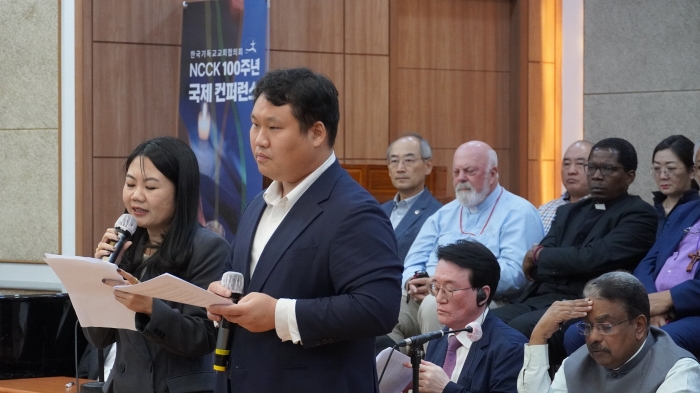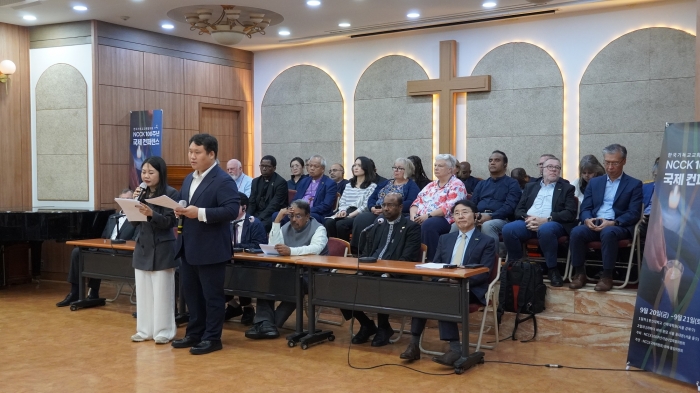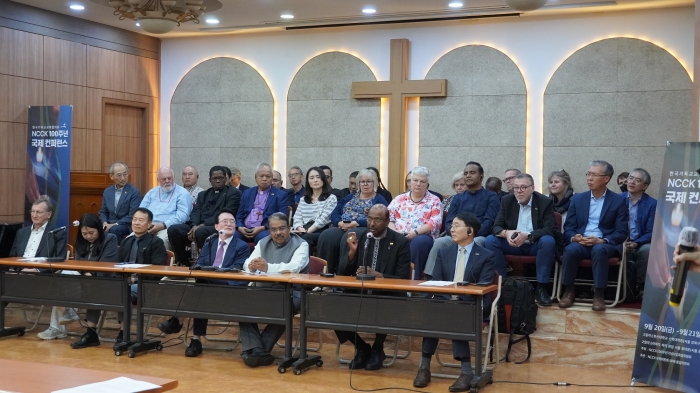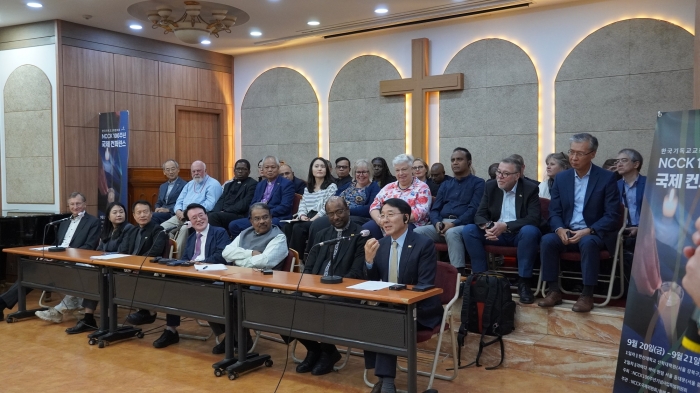
[ENG]
Communiqué of the NCCK’s 100th Anniversary International Conference:
“God of Life, Renew All Creation in Your Love”
The International Conference for the 100th Anniversary of the National Council of Churches in Korea (NCCK) met in Seoul, on September 20-22, 2024 on the 100th anniversary of the NCCK. Participants from the NCCK were accompanied by delegates and participants representing churches and ecumenical partners from all around the world, in celebration and gratitude for NCCK’s historic and continuing ministry for justice, human rights, creation care, and for peace and reconciliation on the Korean Peninsula.
In 1984, the NCCK and the World Council of Churches (WCC) held a pivotal consultation on ”Peace and Justice in North-East Asia” at Tozanso in Japan, and presented the global church with guidance for achieving peaceful reunification on the Korean Peninsula. The ‘Tozanso Process’ began with the first shared Eucharist between the Christian leaders from North and South Korea at the Glion Conference in Switzerland in 1986, followed by the 1988 Declaration of the Churches of Korea on National Reunification and Peace (88 Declaration), which confessed the guilt of national division and hatred, and presented the basic principles for South Korean church and society for the path to peace and reconciliation on the Korean Peninsula.
In 2008, the Ecumenical Forum for Peace, Reunification, and Cooperation on the Korean Peninsula (EFK) was established as a place of meeting, dialogue and cooperation between NCCK (South) and the Korean Christian Federation (KCF)(North). The international church community and the worldwide Korean diaspora has supported the churches of North and South Korea in their journey for peace and reunification through participation in the EFK and other ecumenical initiatives at various gatherings of the WCC, the Christian Conference of Asia (CCA), the World Communion of Reformed Churches (WCRC), the World Methodist Council (WMC), and their member churches.
Despite these ecumenical efforts, the current situation on the Korean Peninsula represents a new low point of division, renewed tensions and escalating confrontation. New geopolitical circumstances driving these negative developments include intensifying military cooperation among South Korea, the United States and Japan in opposition to that of North Korea and Russia, and to China, and the new foreign policy announced by the North abandoning peaceful reunification with the South as a policy priority. These developments are exacerbating tensions on the Korean Peninsula and increasing the risk of war in the region. In this difficult context, we lament the fact that communication, exchanges and joint activities between the NCCK and KCF have been stalled since 2019.
As we celebrate NCCK’s 100th Anniversary, we have reflected on these ecumenical efforts amidst the geopolitical situation, impacting the future of the Tozanso Process and the ecumenical framework of the EFK. We have heard there is a need for a new holistic approach to our work for peace in the region, working for peaceful co-existence between North and South Korea and a permanent peace regime in the region.
In alignment with the theme of the NCCK’s 100th Anniversary International Conference, “God of Life, Renew All Creation in Your Love,” the new path for our ecumenical engagement for peace should be re-centred on our core ecumenical purpose and calling of reconciliation, in light of the current obstacles to reunification. It should include international ecumenical solidarity and advocacy for demilitarization and multilateral nuclear disarmament, for the lifting of US and UN sanctions against North Korea and initiatives for humanitarian support, as well as for care for creation, diaconal ministry, and justice for all especially the marginalized and vulnerable people within the communities of the Korean Peninsula, through mobilization of grassroots and local churches reflecting the diversity of our communities. We shall also continue resource sharing and communication regarding the ever-changing situation, including raising awareness of the origins of the conflict itself.
- We call for the normalization of diplomatic relations between US and DPRK and an end to the travel-ban on US citizens traveling to the DPRK as an obstacle to diaconal cooperation to humanitarian response and to inter-church relations.
- We call on the churches around the world to pray for peace on the Korean Peninsula and in North-East Asia, including by expanding local participation in the prayers prepared by the NCCK and - when possible again - jointly with KCF.
- We call on the WCC to continue to convene networks to support peace on the Korean Peninsula and to include churches in Russia and China as participants in these discussions. We also call on churches in North America to mobilize and challenge their governments to initiate new peacebuilding efforts on the Korean Peninsula.
- We call for campaigns of education and encounter that challenge prevailing discourses of antagonism and confrontation.
- We call on the churches and ecumenical partners around the world to work alongside young people and women, and the diverse leadership among us, when building bridges for peace and reconciliation.
- We call on all partners to work together to integrate climate justice into all efforts for peacebuilding.
- We appeal for all nations to refrain from increased militarization in the Asia Pacific region and globally, and to remove obstacles to cooperation, including sanctions, in the spirit of the Tozanso Process and the EFK.
- We call for solidarity with grassroots movements of Christians together with Buddhists, other religions, and non-religious people who are working to maintain Article 9 of the Japanese Peace Constitution in order to stop Japan's militarization, which threatens peace in the Korean Peninsula as well as East Asia.
- We call for a recognition and resolution of all wounds and legacies of past colonization in Korea by Japan as a step toward justice and rebuilding trust in this region.
- We re-commit ourselves to support and participate in the Korea Peace Appeal led by the NCCK and other initiatives alongside civil society to replace the Armistice Agreement with a peace agreement.
- We appeal for all nations to refrain from increased militarization in the Asia Pacific region and globally, and to remove obstacles to cooperation, including sanctions, in the spirit of the Tozanso Process and the EFK.
- We call for solidarity with grassroots movements of Christians together with Buddhists, other religions, and non-religious people who are working to maintain Article 9 of the Japanese Peace Constitution in order to stop Japan's militarization, which threatens peace in the Korean Peninsula as well as East Asia.
- We call for a recognition and resolution of all wounds and legacies of past colonization in Korea by Japan as a step toward justice and rebuilding trust in this region.
- We re-commit ourselves to support and participate in the Korea Peace Appeal led by the NCCK and other initiatives alongside civil society to replace the Armistice Agreement with a peace agreement.
September 21st, 2024
NCCK’s 100th Anniversary International Conference






